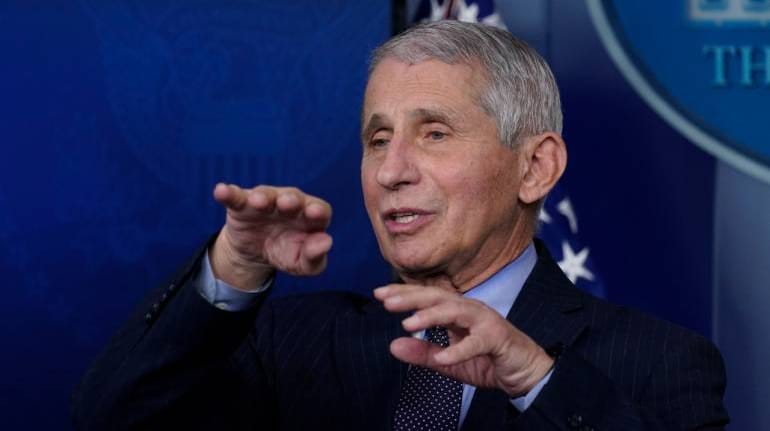



Dr. Anthony S. Fauci, the government’s top infectious disease expert, said Wednesday that the pandemic was not yet over, after telling the “PBS NewsHour” on Tuesday that the United States was “out of the pandemic phase.”
He offered clarification on NPR’s “1A” on Wednesday, saying: “I want to clarify one thing. I probably should have said the acute component of the pandemic phase. And I understand how that can lead to some misinterpretation.”
In comments to PBS and The Washington Post this week, Fauci had said that the country had entered a new phase of the pandemic, because daily counts of confirmed new cases, hospitalizations and deaths were far lower than during the omicron surge over the winter.
On “PBS NewsHour,” Fauci noted that “we don’t have 900,000 new infections a day and tens and tens and tens of thousands of hospitalizations and thousands of deaths.”
And he told The Washington Post on Wednesday, “We’re really in a transitional phase, from a deceleration of the numbers into hopefully a more controlled phase and endemicity.”
In an interview with The Associated Press, also Wednesday, he said that while the country was in a different phase of the pandemic, there was more work to do: “By no means does that mean the pandemic is over.”
He called for more vaccinations and booster shots, and better access to treatments.
“We can’t take our foot off the pedal,” Fauci said. “There’s a lot of viral dynamics throughout the world, and we still may get another variant, which could lead to another potential surge.”
White House press secretary Jen Psaki told reporters Wednesday that Fauci’s comments about being in a different phase of the pandemic are “absolutely true.”
“There’s no question that we are in a moment, a different moment, in our fight against COVID,” she said, but “we also know COVID isn’t over.”
On Tuesday, other federal health officials were reporting sweeping findings about the spread of the coronavirus: Some 60% of Americans have antibodies indicating that they were infected with the virus at least once, the Centers for Disease Control and Prevention reported.
Dr. Ashish Jha, the White House’s COVID coordinator, said at a news briefing Tuesday that completely stopping new infections was “not even a policy goal,” and that he thought the administration should instead concentrate on preventing serious illness, while minimizing infections.
The average number of confirmed new cases reported daily in the United States has risen 61% in the past two weeks. More than 50,000 new cases were reported Tuesday, according to a New York Times database.
Fauci said Tuesday that he believed that even that reported increase was an undercount, because more people are turning to at-home testing and many do not report the results.
Tracking new cases has become more difficult since the omicron peak, with the country recording a steep decrease in the most reliable method, PCR testing. But Dr. Rochelle P. Walensky, the CDC’s director, said the national statistics reflected “a true and reliable drop in our overall cases.”
Dr. Tedros Adhanom Ghebreyesus, the head of the World Health Organization, warned at a news briefing Tuesday that it would be difficult to track the evolution of the coronavirus if countries did not maintain consistent testing.
“When it comes to the deadly virus, ignorance is not a bliss,” he said.
Many countries around the world have loosened pandemic restrictions in recent months and switched to an approach of tolerating the virus’s continued presence, while others have continued to try to stamp it out entirely.
The European Union issued a statement Wednesday that seemed akin to Fauci’s remarks, saying that the bloc was moving out of the “emergency phase” of the pandemic. The EU said it would focus on vaccination, surveillance and testing to prepare for the possibility of a new wave of infections in the fall.
China, by contrast, has been trying to achieve “zero COVID” in the country, but virus outbreaks continue to rage there. Officials in Beijing are trying to test most of the city’s 22 million residents in an effort to avoid imposing a citywide lockdown like the one that has disrupted life in Shanghai for weeks.
In Washington, the annual White House Correspondents’ Dinner will be held Saturday for the first time since 2019, and 2,600 politicians, journalists and officials are expected to attend. Fauci, 81, will not be there, he said, “because of my individual assessment of my personal risk.”
With the virus racing through the Biden administration and Vice President Kamala Harris testing positive Tuesday, President Joe Biden, 79, made his own risk assessment of the dinner in consultation with his doctors. He is expected to attend and “showcase his support for the free press,” Psaki said, but he will not eat at the event and may wear a mask when he is not speaking.
This article originally appeared in The New York Times.
By Alyssa Lukpat
Discover the latest Business News, Sensex, and Nifty updates. Obtain Personal Finance insights, tax queries, and expert opinions on Moneycontrol or download the Moneycontrol App to stay updated!
Find the best of Al News in one place, specially curated for you every weekend.
Stay on top of the latest tech trends and biggest startup news.